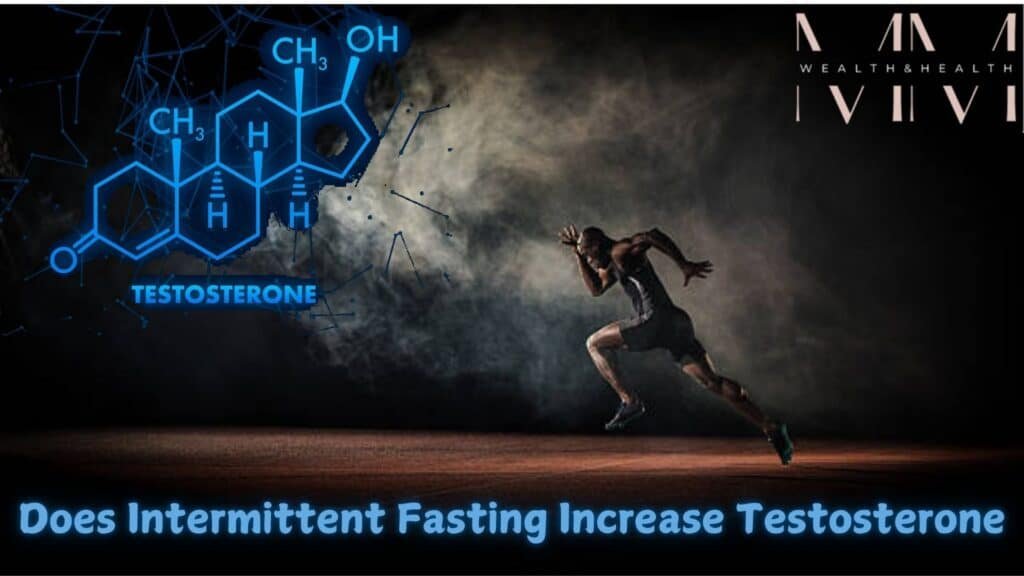Boosting Testosterone
“Can skipping meals boost your testosterone? While some say intermittent fasting is a natural testosterone booster, others argue it harms hormone levels. What does science say?”
Among various dieting strategies, fasting diets, where food intake is restricted for a set period, have gained popularity for their effectiveness in reducing calorie intake and promoting overall health. Does intermittent fasting increase testosterone? This blog dives deep into how intermittent fasting works, its impact on testosterone production, and the different fasting techniques you can try. Reading through will clear doubts and help you decide if this approach fits your lifestyle and health goals.

The most effective way of fasting method is intermittent fasting, which has been widely embraced in the health conditions and fitness community as a potential way to enhance testosterone levels. However, following this diet requires careful planning and discipline. Before incorporating intermittent fasting into your routine, it’s essential to understand how it works, the different fasting techniques available, and its impact on testosterone production.
Does Intermittent Fasting Increase Testosterone?
Intermittent fasting (IF) has gained significant attention in recent years as an effective strategy for weight loss and improving metabolic health. However, a critical question arises: can intermittent fasting also enhance testosterone levels, which play a vital role in muscle growth, energy, and overall vitality? To understand this potential relationship, it’s essential to explore the current scientific findings, prevalent myths, and the reality of how fasting might influence hormone production, particularly in men experiencing low testosterone.
The existing research on the connection between intermittent fasting and testosterone levels presents a somewhat unclear picture. While some studies suggest that fasting may influence the processes involved in testosterone production, there is no definitive agreement on whether these fasting protocols result in increased or decreased hormone levels.

One frequently referenced study from 1989 involved nine obese men and eight non-obese men, examining the effects of overnight fasting on luteinising hormone (LH), which is essential for testicular function and testosterone production. While the study found no changes in LH levels in obese men, fasting led to a 67% increase in LH among non-obese men, subsequently correlating with a 180% boost in testosterone levels.
However, the validity of these findings is limited due to the small sample size, and subsequent studies have produced varying results. For instance, some research indicates that periods of energy restriction can decrease both LH and testosterone levels. More recent studies have echoed these findings, illustrating that energy restriction may lead to lower testosterone levels.
Despite these mixed results, there are reasons to believe that intermittent fasting could indirectly support testosterone levels. Research indicates that increasing muscle mass and reducing body fat are positively correlated with improved testosterone levels. Therefore, while the direct relationship between intermittent fasting and testosterone production remains complex and not fully understood, practices that promote muscle growth and weight loss through intermittent fasting, combined with an appropriate diet and exercise, may facilitate an increase in testosterone levels.
Also, intermittent fasting has potential benefits in addressing several factors that may hinder testosterone production, such as:
1. Chronic Inflammation: Numerous studies have indicated that chronic inflammation negatively affects testosterone levels, particularly in obese individuals. A study published in 2018 in the American Journal of Physiology suggested that both chronic and acute inflammatory conditions can impair the function of Leydig cells, leading to reduced testosterone production. Chronic inflammation can also elevate cortisol levels, which are associated with low testosterone. Intermittent fasting may mitigate chronic inflammation by reducing pro-inflammatory cytokine expression and decreasing body fat, thereby potentially lowering cortisol levels and indirectly promoting testosterone production.
2. Oxidative Stress: Oxidative stress, caused by an excess of free radicals in the body, can lead to various health issues and inflammation, ultimately contributing to reduced testosterone levels. Research indicates that intermittent fasting may act as a preventive measure against oxidative stress markers. By promoting caloric deficit and reducing overall calorie intake, intermittent fasting has been shown to lower oxidative stress levels.
What Is Intermittent Fasting?
Intermittent fasting (IF) is a dietary approach that alternates between periods of eating and fasting, focusing more on the timing of food consumption rather than the types of food eaten. There are several popular methods of intermittent fasting, including:
1. The 5:2 Method: This method allows you to maintain a regular diet schedule for five days of the week with a calorie intake of 500-600 calorie meals on two non-consecutive days. For instance, you might choose to fast on Wednesday and Friday, enjoying normal meals throughout the rest of the week.
2. The Alternate Day Fast: This approach involves alternating between days of normal eating and days of fasting. Typically, you would eat normally one day and then either completely abstain from food or consume a small meal (around 500 calories) the following day, repeating this cycle throughout the week.

3. The 16:8 Fast: Also known as time-restricted fasting, this method requires individuals to skip breakfast and consume food within an eight-hour window, often between 1:00 and 9:00 p.m. The remaining 16 hours of the day are spent fasting.
4. Eat-Stop-Eat Method: This method involves fasting for a full 24 hours once or twice a week. For example, if you finish eating at 12:30 p.m. on one day, you would refrain from eating again until the same time the next day. During fasting periods, calorie-free beverages like water, unsweetened black coffee, or tea can be consumed to stay hydrated.
5. The Warrior Diet: This more advanced form of intermittent fasting is recommended for those with prior experience. The Warrior Diet involves fasting for 20 hours, during which only raw fruits and vegetables can be consumed. A larger meal is then eaten during a four-hour eating window in the evening.
Each of these methods offers a different approach, allowing individuals to choose the one that best fits their lifestyle changes and preferences. These strategies focus on decreasing overall calorie consumption while enhancing metabolic health by enabling the body to tap into its fat reserves during designated fasting intervals. By establishing a caloric deficit, intermittent fasting (IF) compels the body to utilize these fat stores for energy, leading to better insulin sensitivity and increased energy expenditure. However, the question remains: Can Intermittent fasting help to boost testosterone levels?
What is Testosterone and Why It Matters?
Testosterone, commonly referred to as the male hormone, plays a vital role in both men and women. This hormone is essential for various bodily functions that contribute to overall well-being and optimal health. Adequate levels of testosterone are crucial for sexual function, maintenance of muscle mass, energy levels, mood regulation, fetal development, and sex drive, among many other processes.
Testosterone production and the maintenance of the key hormone balance are influenced by a multitude of factors. These can include age, as testosterone levels typically decline with advancing years; dietary habits, which can impact hormonal health; and physical activity, where regular exercise can stimulate testosterone production. Lifestyle choices such as stress management, sleep quality, and substance use, including the use of anabolic steroids, also play significant roles. Also, underlying medical conditions, like obesity or certain endocrine disorders, can further complicate hormone balance.

To optimize energy levels and maintain essential bodily functions while minimizing potential adverse effects, achieving and maintaining a healthy hormonal balance is critical. Testosterone impacts several important areas of health, including:
– Muscle Growth: Testosterone is a key driver in promoting the development and maintenance of muscle tissue. Higher testosterone levels are often associated with improved strength, endurance, and overall physical performance.
– Bone Density: This hormone plays a crucial role in maintaining strong bones. It aids in the regulation of bone mineral density, which is vital for reducing the risk of osteoporosis and fractures, especially as individuals age.
– Libido: Testosterone significantly influences sexual desire or libido. Optimal levels are necessary for maintaining a healthy sex drive in both men and women.
– Mood: Testosterone also affects mood stability and cognitive function. Low levels can lead to mood swings, irritability, and increased susceptibility to mood disorders like depression and anxiety.
When testosterone levels are low, individuals may experience a variety of health issues, such as chronic fatigue, decreased muscle mass, loss of motivation, mood fluctuations, and an overall decline in quality of life. Addressing low testosterone levels through lifestyle changes, medical intervention, or dietary adjustments is essential for improving health and well-being. So, a piece of medical advice is a must when you approach any diet plan or intermittent fasting as well.
Intermittent Fasting & Testosterone – The Science behind it
Research indicates that the effects of intermittent fasting (IF) may significantly increases testosterone levels through several key physiological mechanisms:
1. Reduced Insulin Levels and Increased Human Growth Hormone (HGH) – Engaging in fasting practices leads to a marked decrease in insulin levels, which plays a crucial role in optimizing testosterone production. Short-term fasting can cause a dramatic spike in HGH levels, potentially increasing them by up to 2,000%. This surge in HGH not only supports the synthesis of testosterone but also promotes muscle growth and facilitates fat loss. Various studies have shown that fasting can elevate HGH levels significantly, by as much as 300% to 500% in certain instances, thereby creating an environment conducive to testosterone synthesis.

2. Fat Loss and Improved Hormonal Balance – Excess body fat, especially visceral fat concentrated around the abdomen, is often associated with elevated estrogen levels and diminished testosterone levels. Intermittent fasting effectively helps induce a caloric deficit, which promotes fat loss and encourages a more favorable testosterone-to-estrogen ratio. When there is excess body fat, testosterone can be converted into estrogen, leading to hormonal imbalance. By reducing fat mass, IF indirectly boosts free testosterone levels. Also, improved insulin sensitivity resulting from fasting is linked to lower insulin levels, which correlate with enhanced testosterone production.
3. Enhanced Cellular Repair and Reduced Inflammation – The process of fasting initiates autophagy, a vital cellular repair mechanism that helps maintain healthy physiological function. It also plays a critical role in reducing chronic inflammation, an issue associated with hormonal imbalances and decreased testosterone levels. Leydig cells in the testes are responsible for testosterone production, and a landmark study from 1989 found that fasting resulted in a remarkable 180% increase in testosterone levels among non-obese men. This increase is likely attributable to the heightened activity of luteinizing hormone (LH), which is pivotal for testosterone synthesis.
4. Increased Sensitivity to Luteinizing Hormone (LH) – Intermittent fasting may improve the body’s responsiveness to luteinizing hormone, which is essential for signaling the testes to produce testosterone. Enhanced sensitivity to LH can lead to better regulation of overall hormone levels, contributing to improved hormonal health.
5. Reduced Oxidative Stress and Inflammation – Chronic inflammation can severely hinder testosterone synthesis. Intermittent fasting serves to lower levels of pro-inflammatory cytokines and cortisol, which in turn protects the balance of hormones. By reducing oxidative stress, fasting helps create a more favorable environment for testosterone production and overall hormonal equilibrium.
What the Research Says about IF and Testosterone
Short-Term Fasting and Luteinizing Hormone (LH) Dynamics: A study published in The Journal of Clinical Endocrinology & Metabolism investigated the effects of short-term fasting on LH secretion in normal-weight sedentary women. The findings indicated that while fasting altered LH secretory dynamics, it did not significantly impact overall reproductive function.
Impact of Weight Loss on Testosterone Levels: A review in Cureus examined the relationship between body mass index (BMI) and testosterone levels, focusing on how weight loss can influence hormonal health. The study concluded that weight loss, often achieved through dietary interventions like intermittent fasting, can positively affect testosterone levels in overweight and obese individuals.
Fasting and Neuroendocrine Function: Research published in The Journal of Clinical Endocrinology & Metabolism explored the effects of fasting on neuroendocrine function and follicle development in women. The study found that a 72-hour fast led to transient changes in neuroendocrine function but did not alter follicle development or the length of the follicular phase.academic.oup.com
What is the Impact of Fasting Regimens on Testosterone
Intermittent fasting (IF) has garnered attention for its potential effects on testosterone levels, but research indicates that its impact varies based on factors like body composition and the specific fasting regimen employed.
Caloric Restriction and Hormonal Stress: Prolonged fasting can lead to significant caloric restriction, which may elevate cortisol levels, a stress hormone known to suppress testosterone production. This response is particularly evident in obese individuals, where extended fasting periods have been associated with decreased testosterone levels. The body’s energy conservation mechanisms during severe caloric restriction can suppress reproductive hormones, including testosterone.

Time-Restricted Feeding (TRF): A 2022 systematic review and meta-analysis examined the combined effects of TRF and resistance training on body composition and metabolic health. While the primary focus was not solely on testosterone levels, the study found that TRF, when paired with resistance training, led to favorable outcomes in body composition and metabolic health. These findings suggest that TRF may have a positive influence on hormonal balance, including testosterone, especially in non-obese individuals.
Alternate-Day Fasting (ADF): In contrast, a 2022 study published in Frontiers in Physiology investigated the metabolic effects of ADF in males with obesity, both with and without type 2 diabetes. The study found that ADF led to oscillations in energy stores and had complex effects on metabolism. While the primary outcomes focused on metabolic health, the findings suggest that ADF may not be as beneficial for testosterone levels in obese individuals, potentially due to the stress of prolonged fasting periods and the body’s subsequent hormonal responses.
The relationship between intermittent fasting and testosterone levels is nuanced. Factors such as body composition, the specific type of fasting regimen, and the duration of fasting play critical roles in determining outcomes. While TRF may offer benefits for testosterone levels in non-obese individuals, ADF could have adverse effects, particularly in obese populations. It’s essential to consider individual health status and consult with healthcare professionals before embarking on any fasting regimen to ensure it aligns with personal health goals and hormonal balance.
How Intermittent fasting (IF) Affects Other Hormones
Intermittent fasting (IF) has a profound effect on various hormones, working synergistically rather than in isolation. Here’s how IF impacts some key hormones that play crucial roles in health and metabolism:
1. Insulin: During fasting periods, the body experiences more stable blood sugar levels, which helps reduce insulin resistance. This is particularly important, as high insulin resistance is linked to lower testosterone levels. By fostering a more efficient insulin response, IF can create an environment that supports higher testosterone production.

2. Leptin and Ghrelin: IF has been shown to enhance leptin sensitivity, making the body more responsive to this hormone, which signals satiety and helps curb hunger. Also, IF lowers level of ghrelin, known as the “hunger hormone.” Together, these changes can significantly reduce appetite, making it easier to manage body weight and spur weight loss efforts.
3. Sex Hormone-Binding Globulin (SHBG): As IF helps lower levels of SHBG, this results in greater availability of free testosterone in the bloodstream. Free testosterone is crucial as it can directly influence muscle tissue growth and energy levels, promoting better physical performance and overall vitality.
4. Cortisol: While short-term fasting might cause a temporary spike in cortisol, often referred to as the stress hormone, IF’s overall anti-inflammatory effects can help stabilize cortisol levels in the long run. This balance is essential for maintaining a healthy hormonal profile and managing stress responses effectively.
The TRT Connection – Can Fasting Enhance Therapy?
For men on testosterone replacement therapy (TRT), IF offers potential benefits:
- Fat Loss: Trimming fat mass optimizes hormone absorption and reduces estrogen conversion.
- Metabolic Health: Improved insulin sensitivity and blood pressure support TRT efficacy.
But Beware: Extreme calorie restriction risks muscle loss and hormonal imbalances. Pair IF with:
- Adequate Protein: Prioritize protein intake during eating windows.
- Resistance Training: Preserve muscle mass and amplify testosterone synthesis.
Always consult a healthcare provider before combining IF with TRT.
Optimizing IF for Testosterone – Best Practices
Prioritize Nutrient-Dense Foods: Healthy fats (e.g., avocados, fatty acids), lean proteins, and fiber stabilize blood sugar and hormone production.
Avoid Overtraining: Balance fasting with enough sleep and recovery to prevent cortisol spikes.
Experiment With Fasting Periods: Start with 12–14 hour fasts; avoid >16 hours unless metabolically adapted.
Monitor Progress: Track body weight, fat mass, and energy levels. Adjust based on health status.
Ultimate Guide of Intermittent fasting in Amazon!
Looking for a simple, effective way to lose weight, balance your hormones, and boost your metabolism? Intermittent Fasting for Women by Patricia Nestor is your go-to guide! Designed specifically for women, this book breaks down intermittent fasting in an easy, practical way, no complicated rules, just real strategies that fit into your daily life. Whether you’re just starting or want to fine-tune your approach, Nestor gives you science-backed insights to help you see real, lasting results. Take control of your health, feel your best, and start your transformation today, this is the only fasting guide you’ll ever need!
Conclusion
Intermittent fasting indirectly supports testosterone production through fat loss, improved insulin sensitivity, and reduced inflammation. However, results vary, non-obese men often benefit more than obese individuals. For best results, combine IF with strength training, a healthy diet rich in healthy fats, and sufficient sleep.
If you’re battling low testosterone levels, consult a healthcare provider to tailor a dietary approach that aligns with your hormonal needs.



